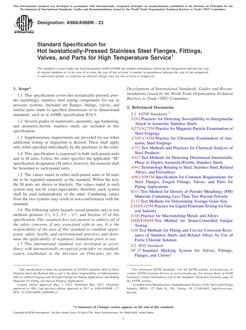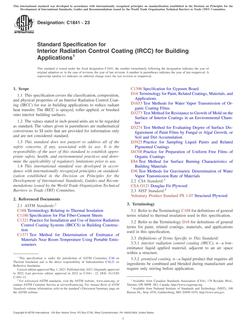
ASTM F963-96ae2
- Comments Off on ASTM F963-96ae2
- ASTM
1.1 This specification relates to possible hazards that may not be recognized readily by the public and that may be encountered in the normal use for which a toy is intended or after reasonably foreseeable abuse. It does not purport to cover every conceivable hazard of a particular toy. This specification does not cover product performance or quality, except as related to safety. Except for the labeling requirements pointing out the functional hazards and age range for which the toy is intended, this specification has no requirements for those aspects of a toy that present an inherent and recognized hazard as part of the function of the toy. Such an example is a sharp point necessary for the function of a needle. The needle is an inherent hazard that is well understood by the purchaser of a toy sewing kit, and this hazard is communicated to the user as part of the normal educational process.
1.2 On the other hand, while a riding toy has inherent hazards associated with its use (for example, falling off onto the sidewalk), the possible hazards associated with its construction (sharp edges, exposed mechanisms, etc.) will be minimized by the application of this specification.
1.3 This specification covers requirements and contains test methods for toys intended for use by children in age groups through 14 years. Different age limits for various requirements will be found in this specification. These limits reflect the nature of the hazards and expected mental or physical ability, or both, of a child to cope with the hazards.
1.4 Articles not covered by this specification are as follows:
Bicycles
Tricycles
Sling shots and sharp-pointed darts
Playground equipment
Non-powder guns
Kites
Hobby and craft items in which the finished item is notprimarily of play value
Model kits in which the finished item is not primarily of play value
Crayons, paints, chalks, and other similar art materials inwhich the material itself or the finished item is notprimarily of play value, except that all art materials,whether or not a component of a toy, must comply to LHAMA, in accordance with 4.31.1-4.31.3.
Sporting goods, camping goods, athletic equipment, mu-sical instruments, and furniture; however, toys that aretheir counterparts are covered. (It is recognized thatthere is often a fine line between, for example, a musicalinstrument or a sporting item and its toy counterpart. The intention of the producer or distributor, as well asnormal use and reasonably foreseeable abuse, deter-mines whether the item is a toy counterpart.)
Powered models of aircraft, rockets, boats, and landvehicles; however, toys that are their counterparts are covered.
1.5 General guidelines for age labeling toys and toy packaging are contained in Annex A1.
1.6 Information regarding packaging and shipping is contained in Annex A2. A table to serve as a guide to the requirements contained in this specification, as applicable to various toy categories, is provided in Annex A3.
1.7 This consumer safety specification includes the following sections:
| Title | Section |
| Scope | 1 |
| Referenced Documents | 2 |
| Terminology | 3 |
| Safety Requirements | 4 |
| Material Quality | 4.1 |
| Flammability | 4.2 |
| Toxicology | 4.3 |
| Electrical/Thermal Energy | 4.4 |
| Impulsive Noise | 4.5 |
| Small Objects | 4.6 |
| Accessible Edges | 4.7 |
| Accessible Points | 4.8 |
| Projections | 4.9 |
| Nails and Fasteners | 4.10 |
| Wires or Rods | 4.11 |
| Packaging Film | 4.12 |
| Cords and Elastics | 4.13 |
| Wheels, Tires, and Axles | 4.14 |
| Folding Mechanisms and Hinges | 4.15 |
| Holes, Clearance, and Accessibility of Mechanisms | 4.16 |
| Stability and Over-Load Requirements | 4.17 |
| Confined Spaces | 4.18 |
| Simulated Protective Devices | 4.19 |
| Projectile Toys | 4.20 |
| Rattles | 4.21 |
| Pacifiers | 4.22 |
| Squeeze Toys | 4.23 |
| Teethers and Teething Toys | 4.24 |
| Toys Intended to be Attached to a Crib | |
| or Playpen | 4.25 |
| Toy Chests | 4.26 |
| Battery-Operated Toys | 4.27 |
| Flotation Toys | 4.28 |
| Stroller and Carriage Toys | 4.29 |
| Stuffed and Beanbag-Type Toys | 4.30 |
| Art Materials | 4.31 |
| Toy Gun Marking | 4.32 |
| Balloons | 4.33 |
| Marbles | 4.34 |
| Balls | 4.35 |
| Preschool Play Figures | 4.36 |
| Pompoms | 4.37 |
| Safety Labeling Requirements | 5 |
| Instructional Literature | 6 |
| Producer’s Markings | 7 |
| Test Methods | 8 |
| General | 8.1 |
| Testing for Hazardous Substance Content | 8.2 |
| Method to Dissolve Soluble Matter | 8.3 |
| Tests for Cleanliness and Preservative Effectiveness | 8.4 |
| Normal Use Testing | 8.5 |
| Abuse Testing | 8.6 |
| Impact Tests | 8.7 |
| Torque Tests for Removal of Components | 8.8 |
| Tension Test for Removal of Components | 8.9 |
| Compression Test | 8.10 |
| Tests for Tire Removal and Snap-in Wheel and | |
| Axle Assembly Removal | 8.11 |
| Flexure Test | 8.12 |
| Test for Mouth-Actuated Toys | 8.13 |
| Tests for Toy Chest Lids and Closures | 8.14 |
| Projectiles | 8.15 |
| Test for Stability of Ride-On Toys | 8.16 |
| Identification | 9 |
| Age Grading Guidelines | Annex A1 |
| Packaging and Shipping | Annex A2 |
| Requirements Guide by Toy Categories | Annex A3 |
| Design Guidelines for Toys Attached to Cribs | |
| or Playpens | Annex A4 |
| Flammability Testing Procedure for Toys | Annex A5 |
1.8 The values stated in inch-pound units are to be regarded as the standard. The values given in parentheses are for information only.
1.9 The following precautionary statement pertains only to the test methods portion, Section 7, of this specification: This standard does not purport to address all of the safety concerns, if any, associated with its use. It is the responsibility of the user of this standard to establish appropriate safety and health practices and determine the applicability of regulatory limitations prior to use.
Product Details
- Published:
- 11/10/1996
- Number of Pages:
- 34
- File Size:
- 1 file , 380 KB



